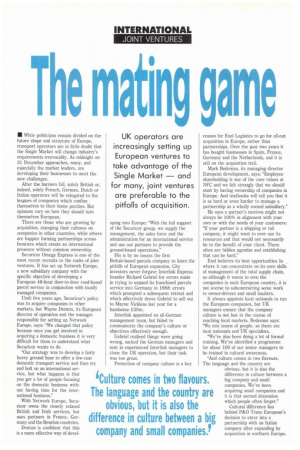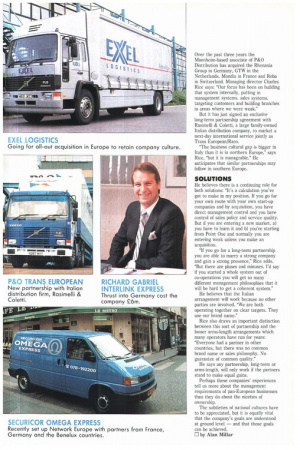The mating ganie
Page 40

Page 41

If you've noticed an error in this article please click here to report it so we can fix it.
• While politicians remain divided on the future shape and structure of Europe, transport operators are in little doubt that the Single Market will change industry's requirements irrevocably. As midnight on 31 December approaches, many, and especially the market leaders, are developing their businesses to meet the new challenges.
After the barriers fall, solely British or, indeed, solely French, German, Dutch or Italian operators will be relegated to the leagues of companies which confine themselves to their home patches. But opinions vary on how they should turn themselves European.
There are those who are growing by acquisition, stamping their cultures on companies in other countries, while others are happier forming partnerships across frontiers which create an international presence without common ownership.
Securicor Omega Express is one of the most recent recruits to the ranks of joint ventures. It has set up Network Europe, a new subsidiary company with the specific objective of developing a European 48-hour door-to-door road-based parcel service in conjunction with locally managed companies.
Until five years ago, Securicor's policy was to acquire companies in other markets, but Wayne Denton, its European director of operation and the manager responsible for setting up Network Europe, says: "We changed that policy because once you get involved in acquiring a domestic business it is very difficult for them to understand what Securicor wants to do.
"Our strategy was to develop a fairly heavy ground base to offer a low-cost domestic transport service and then try and bolt on an international service, but what happens is that you get a lot of people focusing on the domestic business without having time for the international business."
With Network Europe, Securicor owns the closely related British and Irish services, but uses partners in France, Germany and the Benelux countries.
Denton is confident that this is a more effective way of devel oping into Europe: "With the full support of the Securicor group, we supply the management, the sales force and the administration for an international service and use our partners to provide the ground-based operations."
His is by no means the first British-based parcels company to learn the pitfalls of European expansion. City investors never forgave Interlink Express founder Richard Gabriel for errors made in trying to expand its franchised parcels service into Germany in 1988: errors which prompted a subsequent retreat and which effectively drove Gabriel to sell out to Mayne Nickless last year for a handsome £50m.
Interlink appointed an all-German management team, but failed to communicate the company's culture or objectives effectively enough.
Gabriel realised things were going wrong, sacked the German managers and sent in experienced Interlink managers to clone the UK operation, but their task was too great.
Protection of company culture is a key reason for Exel Logistics to go for all-out acquisition in Europe, rather than partnerships. Over the past two years it has bought businesses in Spain, France, Germany and the Netherlands, and it is still on the acquisition trail.
Mark Bedernan, its managing director European development, says: "Employee shareholding is one of the core values at NFC and we felt strongly that we should start by having ownership of companies in Europe. And textbooks will tell you that it is as hard or even harder to manage a partnership as a wholly owned subsidiary."
He says a partner's motives might not always be 100% in alignment with your own or with the needs of your customers: "If your partner is a shipping or rail company, it might want to over use its resources and that would not necessarily be to the benefit of your client. There often are hidden agendas and establishing that can be hard."
Exel believes its best opportunities lie where it can concentrate on its core skills of management of the total supply chain, so although it wants to own the companies in each European country, it is not averse to subcontracting some work to owner-drivers and small hauliers.
It always appoints local nationals to run the European companies, but UK managers ensure that the company culture is not lost in the course of reaching local markets. Bedeman says: "We mix teams of people, so there are local nationals and UK specialists.
"We've also been doing a lot of formal training. We've identified a programme for about 100 of our senior managers to be trained in cultural awareness.
And culture comes in two flavours. The language and the country are obvious, but it is also the difference in culture between a big company and small companies. We've been acquiring small companies and it is that second dimension which people often forget."
s.
are
Cultural difference lies behind MO Trans European's decision to enter into a partnership with an Italian company after expanding by acquisition in northern Europe. Over the past three years the Mannheim-based associate of P&O Distribution has acquired the Rhenania Group in Germany, GTW in the Netherlands, Mondia in France and Roba in Switzerland. Managing director Charles Rice says: "Our focus has been on building that system internally, putting in management systems, sales systems, targeting customers and building branches in areas where we were weak."
But it has just signed an exclusive long-term partnership agreement with Rasimelli & Coletti, a large family-owned Italian distribution company, to market a next-day international service jointly as Trans Europeart/Raco.
"The business cultural gap is bigger in Italy than it is in northern Europe," says Rice, "but it is manageable." He anticipates that similar partnerships may follow in southern Europe.
SOLUTIONS
He believes there is a continuing role for both solutions: "It's a calculation you've got to make in my position. If you go for your own route with your own start-up companies and by acquisition, you have direct management control and you have control of sales policy and service quality. But if you are entering a new market, a) you have to learn it and b) you're starting from Point One and normally you are entering weak unless you make an acquisition.
"If you go for a long-term partnership you are able to marry a strong company and gain a strong presence," Rice adds, "But there are pluses and minuses, I'd say if you started a whole system out of co-operations you will get so many different management philosophies that it will be hard to get a coherent system."
He believes that the Italian arrangement will work because no other parties are involved. We are both operating together on clear targets. They use our brand name."
Rice also draws an important distinction between this sort of partnership and the looser arms-length arrangements which many operators have run for years: "Everyone had a partner in other countries, but there was no common brand name or sales philosophy. No guarantee of common quality."
He says any partnership, long-term or arms-length, will only work if the partners stand to make equal gains.
Perhaps these companies' experiences tell us more about the management requirements of pan-European businesses than they do about the niceties of ownership.
The subtleties of national cultures have to be appreciated, but it is equally vital that the company's goals are understood at ground level — and that those goals can be achieved.
El by Alan Millar












































































